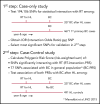Genetic susceptibility to radiation-induced breast cancer after Hodgkin lymphoma
- PMID: 30573632
- PMCID: PMC6405334
- DOI: 10.1182/blood-2018-07-862607
Genetic susceptibility to radiation-induced breast cancer after Hodgkin lymphoma
Abstract
Female Hodgkin lymphoma (HL) patients treated with chest radiotherapy (RT) have a very high risk of breast cancer. The contribution of genetic factors to this risk is unclear. We therefore examined 211 155 germline single-nucleotide polymorphisms (SNPs) for gene-radiation interaction on breast cancer risk in a case-only analysis including 327 breast cancer patients after chest RT for HL and 4671 first primary breast cancer patients. Nine SNPs showed statistically significant interaction with RT on breast cancer risk (false discovery rate, <20%), of which 1 SNP in the PVT1 oncogene attained the Bonferroni threshold for statistical significance. A polygenic risk score (PRS) composed of these SNPs (RT-interaction-PRS) and a previously published breast cancer PRS (BC-PRS) derived in the general population were evaluated in a case-control analysis comprising the 327 chest-irradiated HL patients with breast cancer and 491 chest-irradiated HL patients without breast cancer. Patients in the highest tertile of the RT-interaction-PRS had a 1.6-fold higher breast cancer risk than those in the lowest tertile. Remarkably, we observed a fourfold increased RT-induced breast cancer risk in the highest compared with the lowest decile of the BC-PRS. On a continuous scale, breast cancer risk increased 1.4-fold per standard deviation of the BC-PRS, similar to the effect size found in the general population. This study demonstrates that genetic factors influence breast cancer risk after chest RT for HL. Given the high absolute breast cancer risk in radiation-exposed women, these results can have important implications for the management of current HL survivors and future patients.
© 2019 by The American Society of Hematology.
Conflict of interest statement
Conflict-of-interest disclosure: The authors declare no competing financial interests.
Figures




Comment in
-
Genetic susceptibility to breast cancer in lymphoma survivors.Blood. 2019 Mar 7;133(10):1004-1006. doi: 10.1182/blood-2019-01-894279. Blood. 2019. PMID: 30846507 No abstract available.
References
-
- Aisenberg AC, Finkelstein DM, Doppke KP, Koerner FC, Boivin JF, Willett CG. High risk of breast carcinoma after irradiation of young women with Hodgkin’s disease. Cancer. 1997;79(6):1203-1210. - PubMed
-
- Bhatia S, Yasui Y, Robison LL, et al. ; Late Effects Study Group. High risk of subsequent neoplasms continues with extended follow-up of childhood Hodgkin’s disease: report from the Late Effects Study Group. J Clin Oncol. 2003;21(23):4386-4394. - PubMed
-
- De Bruin ML, Sparidans J, van’t Veer MB, et al. Breast cancer risk in female survivors of Hodgkin’s lymphoma: lower risk after smaller radiation volumes. J Clin Oncol. 2009;27(26):4239-4246. - PubMed
-
- Hodgson DC, Gilbert ES, Dores GM, et al. Long-term solid cancer risk among 5-year survivors of Hodgkin’s lymphoma. J Clin Oncol. 2007;25(12):1489-1497. - PubMed

